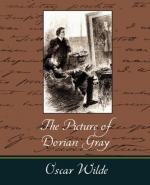It was some foul parody, some infamous ignoble satire. He had never done that. Still, it was his own picture. He knew it, and he felt as if his blood had changed in a moment from fire to sluggish ice. His own picture! What did it mean? Why had it altered? He turned and looked at Dorian Gray with the eyes of a sick man. His mouth twitched, and his parched tongue seemed unable to articulate. He passed his hand across his forehead. It was dank with clammy sweat.
The young man was leaning against the mantelshelf, watching him with that strange expression that one sees on the faces of those who are absorbed in a play when some great artist is acting. There was neither real sorrow in it nor real joy. There was simply the passion of the spectator, with perhaps a flicker of triumph in his eyes. He had taken the flower out of his coat, and was smelling it, or pretending to do so.
“What does this mean?” cried Hallward, at last. His own voice sounded shrill and curious in his ears.
“Years ago, when I was a boy,” said Dorian Gray, crushing the flower in his hand, “you met me, flattered me, and taught me to be vain of my good looks. One day you introduced me to a friend of yours, who explained to me the wonder of youth, and you finished a portrait of me that revealed to me the wonder of beauty. In a mad moment that, even now, I don’t know whether I regret or not, I made a wish, perhaps you would call it a prayer. . . .”
“I remember it! Oh, how well I remember it! No! the thing is impossible. The room is damp. Mildew has got into the canvas. The paints I used had some wretched mineral poison in them. I tell you the thing is impossible.”
“Ah, what is impossible?” murmured the young man, going over to the window and leaning his forehead against the cold, mist-stained glass.
“You told me you had destroyed it.”
“I was wrong. It has destroyed me.”
“I don’t believe it is my picture.”
“Can’t you see your ideal in it?” said Dorian bitterly.
“My ideal, as you call it. . .”
“As you called it.”
“There was nothing evil in it, nothing shameful. You were to me such an ideal as I shall never meet again. This is the face of a satyr.”
“It is the face of my soul.”
“Christ! what a thing I must have worshipped! It has the eyes of a devil.”
“Each of us has heaven and hell in him, Basil,” cried Dorian with a wild gesture of despair.
Hallward turned again to the portrait and gazed at it. “My God! If it is true,” he exclaimed, “and this is what you have done with your life, why, you must be worse even than those who talk against you fancy you to be!” He held the light up again to the canvas and examined it. The surface seemed to be quite undisturbed and as he had left it. It was from within, apparently, that the foulness and horror had come. Through some strange quickening of inner life the leprosies of sin were slowly eating the thing away. The rotting of a corpse in a watery grave was not so fearful.




